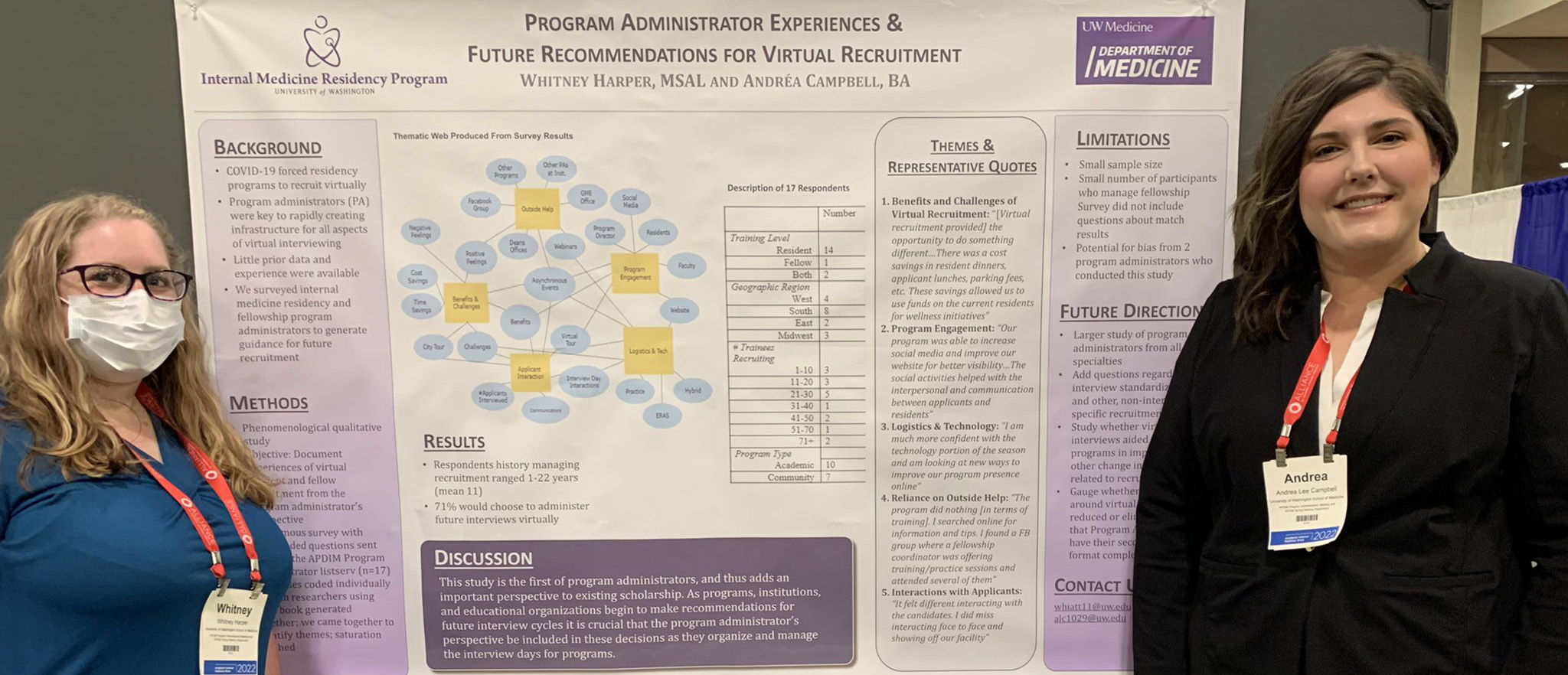
Virtual recruitment: Program administrator experiences and future recommendations
An interview season requires applicants to be interviewed, faculty to conduct interviews, and program administrators to create the infrastructure in which faculty can interview applicants. All three must be present to provide stability to the three-legged stool known as recruitment.
In 2020, residency programs needed to quickly pivot to create a virtual experience for medical students who would be applying for the 2021 Match.
But, with few programs having done virtual recruitment prior to COVID and little literature available, program administrators found themselves tasked with creating an interview day unlike any they had organized before.
With the objective to document experiences of virtual resident and fellow recruitment from the program administrator’s perspective, University of Washington Program Administrators Andréa Campbell and Whitney Harper surveyed internal medicine residency and fellowship program administrators to generate guidance for future recruitment.

methods
- Phenomenological qualitative study
- Anonymous survey with open-ended questions sent through the APDIM Program Administrator listserv (n=17)
- Responses coded individually by both researchers using code book generated together; we came together to identify themes; saturation reached
Limitations
- Small sample size
- Small number of participants who manage fellowship
- Survey did not include questions about match results
- Potential for bias from the program administrators who conducted this study
Results
Of the 17 participants, the majority (82%) stated they recruited for residents only; 12% stated they recruited for residents and fellows, and 6% stated they recruited for fellows only.
Those who reported recruiting fellows stated they recruited for either hematology/oncology or endocrinology. The majority of participants (65%) reported recruiting for 30 trainees or fewer, although some participants reported recruiting over 70 trainees.
All geographic locations were represented, nearly an even split of academic- and community-based programs participated, and participants reported recruiting for various numbers of trainees.
Additionally, participants varied in their length of time managing recruitment for their program(s); some participants were in their first year, while others were in their 22nd year (average was 11 years).
When asked which method they would choose to administer interviews in the future, if given the authority to do so, 71% of respondents said virtual or hybrid.
From the perspective of program administrators, the transition from in person to virtual recruitment provided new opportunities to engage with applicants, program faculty, and people outside of their institution.
Themes
Five strong themes emerged from the responses:
- Benefits and challenges of virtual recruitment
- Program engagement and practice
- Logistics and technology required for virtual recruitment
- Reliance on outside help
- Interactions with applicants
In the coding process, they found that several categories fell into multiple themes. For example, the category asynchronous events relates to all five themes. When they discovered there were several categories that could be assigned to multiple categories they drew a diagram to see how the themes are connected to each other.
Future Directions
This study is the first of program administrators, and thus adds an important perspective to existing scholarship. As programs, institutions, and educational organizations begin to make recommendations for future interview cycles it is crucial that the program administrator’s perspective be included in these decisions as they organize and manage the interview days for programs.
A larger study of program administrators from all specialties would be of great interest to add to the existing data. Based on the findings from this study, the survey could add questions regarding interview standardizations and other, non-interview specific recruitment changes.
It would be interesting to study whether virtual interviews aided residency programs in implementing other change initiatives related to recruitment, especially as programs are now concluding the second cycle of virtual recruitment.
It would also be interesting to gauge whether anxiety around virtual recruitment is reduced or eliminated completely now that program administrators have completed their second year in this format.